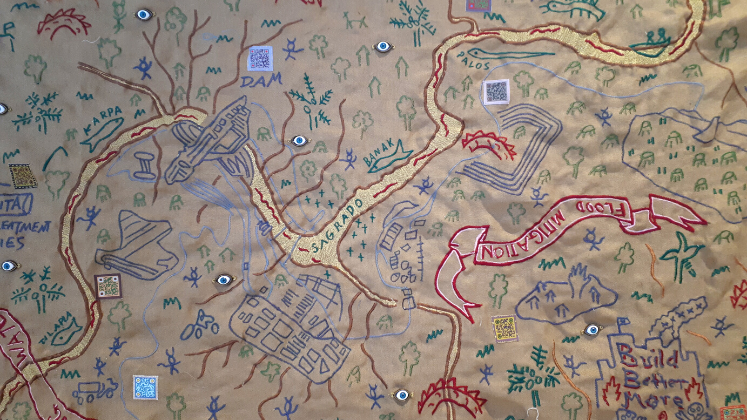Research Impact is the ‘raison d’etre’ of the LSE Impact Blog. This review brings together a selection of posts exploring different aspects of impactful research featured on the LSE Impact Blog over the past year. Want to find even more? You can read a selection of posts on research impact and evidence based policy via the links and all of our annual reviews here.
 Why we need an imperfect impact agenda
Why we need an imperfect impact agenda
Universities are required to tell stories about the impact of their work on the wider world and these tales have a perfection that often elides the imperfect muddling through inherent to much collaborative work. Tadhg Caffrey argues a new emphasis on ‘Imperfect Impact’ can allow research communities to reflect on the challenges and opportunities of partnership work, while still striving to make these relationships stronger.
 Reconnecting community, research and policy through post-Covid recovery
Reconnecting community, research and policy through post-Covid recovery
In the aftermath of COVID-19, the Falkland Islands Government has taken concrete steps to tackle long-standing inequalities, prompted by evidence of the impact of COVID-19 restrictions on local communities. How was the evidence-policy gap bridged in this instance? Flora Cornish and Kate Cochrane reflect on relational policy-making in small countries.
 Can you ever be an expert in research impact?
Can you ever be an expert in research impact?
Demonstrating a specialism for research impact is an increasingly sought after attribute for academics, research adjacent staff and growing numbers of impact professionals. Drawing on work carried out to design a course in foundational knowledge for research impact, Ged Hall and Tamika Heiden explore three dimensions of research impact expertise.
 Finding time for impact – Policy choices incentivising academic behaviours are not zero-sum games
Finding time for impact – Policy choices incentivising academic behaviours are not zero-sum games
Research policy increasingly encourages academics to undertake different activities, such as research, teaching and academic service, yet academic time remains finite. Using the introduction of tuition fees in 2012 as a natural experiment within the UK, Francesco Rentocchini and Ugo Rizzo argue that the implicit focus fees introduced on teaching, limited English and Welsh academics’ wider engagement compared to their Scottish counterparts.
In How to Engage Policy Makers with Your Research: The Art of Informing and Impacting Policy, editors Syahirah Abdul Rahman, Lauren Tuckerman, Tim Vorley and Phil Wallace compile advice from a varied range of contributors on how academics can achieve research impact by connecting with policy makers. This practical resource takes stock of a growing impetus to facilitate pathways from academic research to tangible policy impact, writes Huw Morris.
 Social simulations can teach the tacit dimensions of effective policy advice
Social simulations can teach the tacit dimensions of effective policy advice
Drawing on his ethnographic study of government science advisers, Noam Obermeister argues that much of their work involves learning by doing and that by creating realistic social simulations this expertise can be developed in the classroom.
 By understanding the ends of research can universities regain their relevance?
By understanding the ends of research can universities regain their relevance?
In his famous report Vannevar Bush famously described science and research as an endless frontier. However, as Seth Rudy and Rachael Scarborough King argue, being more attentive to where and how research ends might enable universities to construct environments and organizations that are better able to address society’s most pressing challenges.
 What does it mean to do generous research?
What does it mean to do generous research?
Academia is often thought to function as a reciprocal gift economy, but do its methods and styles always work this way? Rachelle Chadwick draws on her recent research to consider what it means to take generosity as a serious academic position.
There is often an assumption in evidence based policy, that evidence means the findings of quantitative studies or randomised control trials. However, in practice evidence is often understood differently. Drawing on a study of Welsh policy actors, Eleanor MacKillop and James Downe highlight four different approaches to evidence in policymaking and suggest how researchers and policy organisations might use these findings to engage differently with policy.
 Why does impact still feel like an add-on to research designs?
Why does impact still feel like an add-on to research designs?
Reflecting on his role as an academic and member of a research funding organisation, Duncan Green, considers how impact has in some ways still not become embedded in research culture and is often treated a bureaucratic hurdle to overcome.
The content generated on this blog is for information purposes only. This Article gives the views and opinions of the authors and does not reflect the views and opinions of the Impact of Social Science blog (the blog), nor of the London School of Economics and Political Science. Please review our comments policy if you have any concerns on posting a comment below.
Image credit: LSE Impact Blog via Canva.









